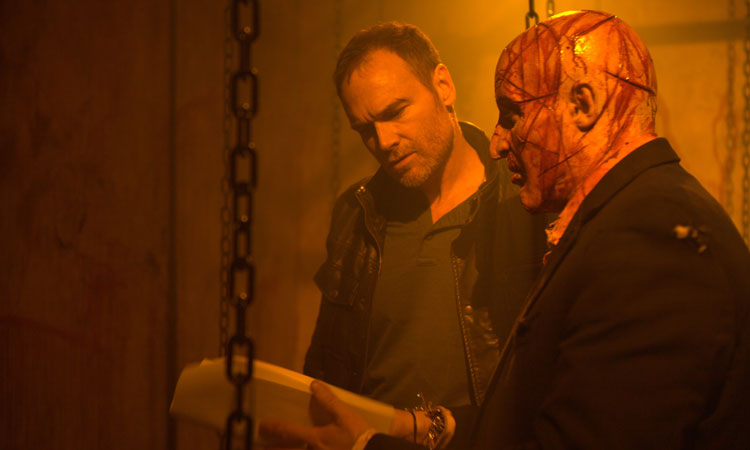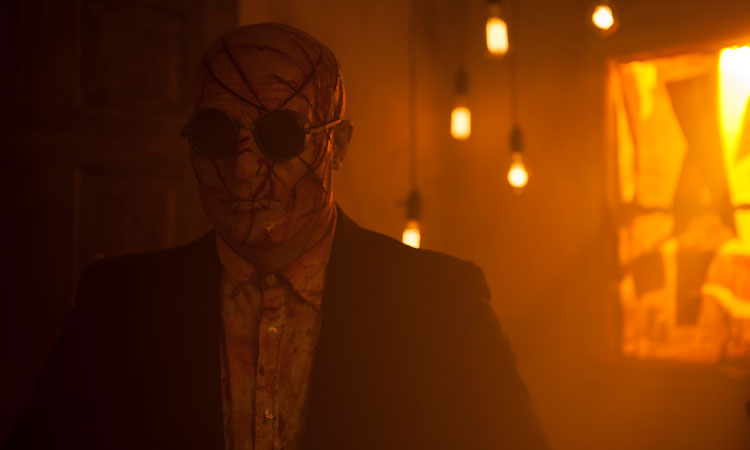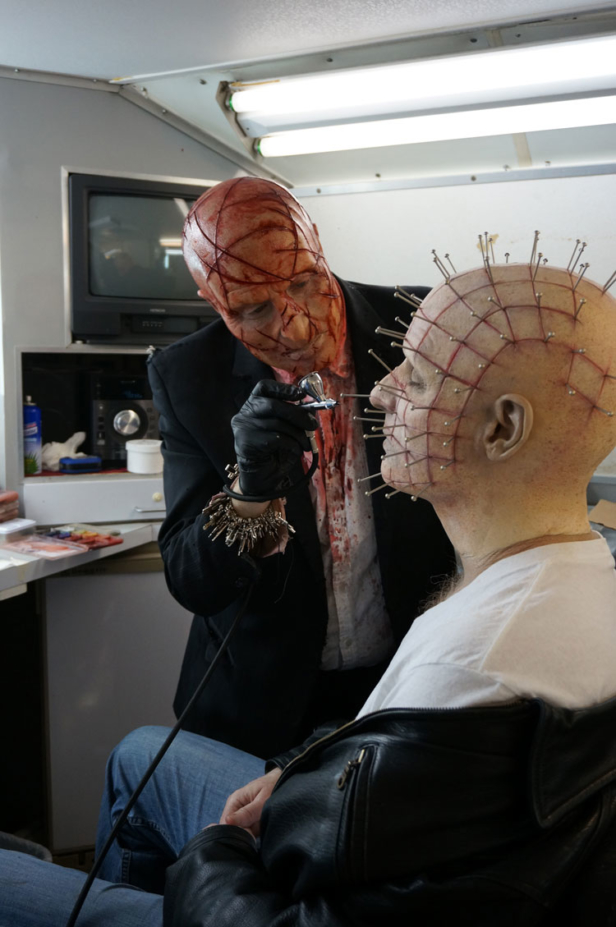Written and directed by long-time Hellraiser collaborator Gary J Tunnicliffe (above left), the latest installment in the franchise is Hellraiser: Judgment, which finds two tough detectives, brothers Sean and David Carter, on the hunt for a gruesome serial killer terrorising their city with a series of murders based on the Ten Commandments. Joining forces with detective Christine Egerton, the trio dig deeper into a spiralling maze of horror that draws them into hell to confront Pinhead.
Starring Heather Langenkamp (A Nightmare on Elm Street), Damon Carney (Fear the Walking Dead), Randy Wayne (Escape Room), and Alexandra Harris (Secret Diary of an American Cheerleader), Hellraiser: Judgment is a very different movie in the series – introducing a whole new work force of evil (overseen by one hell of a middle manager, The Auditor, played by Tunnicliffe) and a whole new take on Pinhead, played by Paul T Taylor, taking over from the mantle from Doug Bradley, who has played the role in all but one Hellraiser movies.
We spoke to Gary J Tunnicliffe about what scary really means, drawing the line at girls drinking vomit and we were even rudely interrupted by The Auditor himself!
When did you first become part of the Hellraiser franchise?
The road to Hellraiser… Obviously in 1987, I saw the film. I was heavily into makeup effects at the time. I looked up at the screen, saw Pinhead and [asked]: Who did that and how did they do it? I want to do that. That was my dream job. My aspirations at 20 were: Work on a Hellraiser film. Do Pinhead. Meet Clive Barker and work in Los Angeles… and all of those happened on Hellraiser 3.
I got to work make the boxes, work with Clive, work in LA and then on the fourth film, I was given the task of being the makeup effects designer. From then on I was a makeup effects designer, but also did things like help out on the story elements or helping out with some stunts, and did some acting.
A couple of times there was a chance for me to write and direct a Hellraiser film and they got squished out by whatever was happening at Dimension at the time, whether it was Scream or whatever. Then on Hellraiser: Revelations I was offered the chance to write and direct it, but I was working on Scream 4 as an effects designer and they wouldn’t release me to go and direct it. That was heart-breaking at the time, so I wrote the script and they then made the film very quickly and changed a lot of what I’d written and made this horrible, horrible film. Although there are still bits of the story I’m very proud of.
“My aspirations at 20 were: Work on a Hellraiser film. Do Pinhead. Meet Clive Barker and work in Los Angeles… and all of those happened on Hellraiser 3.”
Then a few years later I got a call from the producer saying: “Look, Gary, I’m sorry it’s not the film you deserve, it’s not the budget you deserve, but are you still interested in going back and making a Hellraiser film?”And I was like: “Yeah, absolutely. If you’ve got $20 and a video camera, I’ll do it, why wouldn’t I?!”
I had an idea for a screenplay and I sent it to Dimension [who] went: “No, absolutely awful. We hate it.” I said this is the movie. It has to be. It can’t be a re-treading all of the Hellraiser story or another just generic Hellraiser, it has to have a bit of a difference and they were like “okay, take out and try it again”. I did this three or four times, rewrote a pitch and they were like “no no no, it’s still too weird”.
I then rewrote the whole Hellraiser: Judgment treatment and I wrote a new treatment called Hellraiser: Enter Darkness and they went: “Enter Darkness – we love it. That’s the film we want you to make” and I said: “No! I wrote that strictly to show willingness, but the truth is Hellraiser: Judgment is the film you should make!” They went: “Okay here’s the deal – you write Hellraiser: Judgment and if we don’t like it then you will write Enter Darkness for free” and like a mug I went okay, wrote Judgment, sent it in and waited…
Then I got a phone call and they were like: “Yeah we kind of get it now. We kind of see what you’re doing. We have some notes of course.” Which means pages and pages of notes…
So that’s really the road of Hellraiser! It was a long, arduous blood-spattered road that I travelled from a lowly effects guy to working his way up to, what was in the end, writer, director, effects designer, actor, and prop maker all on one film! Because I just wanted everyone’s job, I guess!

What elements of the Hellraiser franchise did you aim to bring to Judgment?
I felt that if you look at the bare bones of what the Pinhead faction is – the Order of the Gash – you open the box, they come, they chain you up and it’s over. That’s kind of their modus operandi – we’ve seen it done in multiple films. It’s been done, we know what they do.
I can’t just keep replaying that. I’m fascinated by the hell aspect of it and that’s why I decided to bring in this other faction, this other group. I figured that hell is a process where you get drawn in and ‘are you a sinner, what were your sins?’ and it came down to that. I had this fascination with what the process would be and although I could only do The Auditor, The Assessor, The Jury, The Surgeon and The Cleaners, I had a whole other bunch of stuff that would go on depending on your sins and how far up the totem pole of evil you went.
So many times with these kind of films, I think writers try to write what they think the fans will like. I tried to do that with Revelations and got crucified for it! So I thought you know what? Fuck it! I wanted weird characters and I want heaven and hell in this movie. I wanted see what the faction is from heaven and that was the story point that I was really interested in. I’m not religious in any way at all but I believe that the characters are from hell – although there are some Hellraiser fans who say that they are not, although Pinhead says in Hellraiser 2: “Your suffering will be legendary even in hell.”
So they are from hell, which means if there’s a hell then there’s a heaven, and to me the most interesting thing hell could be would be if it was run by heaven. If God had a hand in it, in hell and was basically letting them do their thing.
The way I described it to someone else was: ‘It’s the dirty IT department at the bottom of the building that no one wants to go down to. They have to be there and they’re doing their terrible grotesque, scummy little things. But if they get out of line, we have to go down and have a chat with them.’
So when Jophiel (played Helena Grace Donald), a real angel goes down there, clearly she’s supposed to look like: “Eugh, I fucking hate this place. I have to come down. The drudgery of it. To deal with these silly people dressed in their silly outfits.” She regards it like that.
I’ve always been drawn to the eloquence of the Hellraiser characters. They’re not mindless mask-wearing chainsaw-wielding, machete-wielding, knife-stabbing people. Which are great, and have their place in horror and I don’t mean any disregard them, but I’ve always thought that there’s a regality to Pinhead.
“I’ve always been drawn to the eloquence of the Hellraiser characters. They’re not mindless mask-wearing chainsaw-wielding, machete-wielding, knife-stabbing people.”
With The Auditor, he’s doing his job. You’re just a number to him. And that’s why when Sean Carter (played by Damon Carney) turns up and he’s been used to torture, The Auditor is suddenly like: “Oh you’re kind of an interesting character!” He’s a little bit fascinated. It’s just like a little bit of difference in the daily grind of having to do this evil thing.
So I think I was trying to instill that into it. My budget didn’t allow for giant car chases or giant angels, people riding horses through the air and superheroes. So my car chase had to be two people having a conversation across the table and having a back-and-forth repartee, which is actually the hardest stuff to write. It’s easy to write big grandiose special effects sequences, and let CGI guys deliver it. Whereas to try and come up with some interesting dialogue that has some intelligence, subtlety and subtext is a bit more difficult. I’m not saying I’m a brilliant writer, but I think there are sequences in Judgment that are quite fun and have those good little moments. So that was my agenda.
There are some interesting new characters in Judgment – how did you go about creating them and what is your favourite? Ours has to be The Auditor…
Well mine’s The Auditor obviously. I’m biased. That’s why I wanted to play it. Give yourself all the best lines, right.
I hope The Auditor will be well-liked and there’s stuff cut out that’s even funnier. There are some great other lines that the studio didn’t allow me to keep, which I really wish we had kept. But The Auditor’s, one of those characters that…
At this point in our interview, The Auditor rudely interrupts our conversation to tell us how he achiving hell on Earth right now…

The Auditor: I hear you’re a fan? Well, maybe I will have to come and type up a few notes about you sometime…
SciFiNow: We appreciate that you’re wearing a mask Auditor to stop the spread of the virus…
The Auditor: Even in hell we have to be compliant with the rules and isn’t it strange that we spent so much time playing with a little wooden box when a simple virus was enough to get you all down here.
I must tell you that Mr. Jeffrey Epstein has been keeping us busy for quite a while. Yes, yes, he’s made quite a few of The Assessors vomit already.
But yes, things are going along tippidy top here, I can tell you. I will be leaving now and I will get Mr Gary back…
That was a pretty scary experience meeting The Auditor…!
What’s actually scary? I think it’s the context of something scary. I remember I was invited to work on Paranormal Activity and I got a phone call from the producers and they go: “You’re Gary Tunnicliffe right? The Hollywood Assassin? Okay, we have a problem with the end of this film… what’s the scariest thing in the world?”
I went: “In what context?” and they said: “It doesn’t matter, what’s the scariest thing? We need it in the film!”
I was like: “In what context? Like having your mother raped and killed. That’s the scariest thing in the world. The Holocaust. That’s the scariest thing in the world – those kinds of scenarios!”
What works on camera or in a film as being terrifying and scary in reality sometimes is just laughable. Which is why I think George Romero said: ‘If people laugh at horror films sometimes; are they scared or just enjoying it?’
I know for a fact that when I saw Hellraiser (and I’ve always been amazed that people talk about Hellraiser as a horror film or being scared of Pinhead), I was never, ever scared of Pinhead. I was always more intrigued and fascinated. That’s what I was hoping with The Auditor – that you wouldn’t be necessarily be scared of him. That you would kind of like him or find him fascinating. I hope that by the end of it you’re like ‘I’d like to see more of him and I’d like to know a bit more about what goes on in that weird faction and how are they connected to the Cenobites?’. So that’s all I was trying to do, try to elicit some of the reactions that I had to Hellraiser, humbly so, 30 years later with Hellraiser: Judgment.

You mention that you want audiences to be fascinated by Judgment’s characters – what do you think is it about horror that fascinates audiences and still has us interested in its characters long after the film finishes?
Horror and sci-fi are unlike any other film area. Science fiction cons and horror cons are huge because they fascinate and draw in people, especially younger audiences. I think because there’s a taboo and also the imagination is there. So I think maybe they feed on your imagination and your desire to experience something bigger than reality.
I think as you get older, maybe you are interested in those things and I certainly like regular films as much as others, but I think there’s more escapism within science fiction and horror. In sci-fi, it’s a world that you dream and fantasise about. I think in horror, it’s the thrill of a rollercoaster ride. It’s being in danger or the thrill of being scared, but still knowing you’re safe. It’s also that challenge of ‘can these people scare me?’.
It’s weird sometimes. I mean in this film I had criticism of people saying ‘it’s just so grotesque and so disgusting and so horrible and so grimy and nasty and disgusting’. It’s hell! What do you think hell would be like? Is it supposed to be flowers and bunny rabbits and Willy Wonka And The Chocolate Factory? It’s supposed to be disgusting and visceral and violent.
To me it’s Hieronymus Bosch or [Franis] Bacon. It’s supposed to be bizarre and strange. When you look at a Hieronymus Bosch picture and you go: ‘What the fuck is all that going on in there?’
When people call it torture porn I think it is a bit of an insult really because if you gave it to regular writers, they’d be like ‘ohh we’re going to slice skin and chop it all up and blood and guts and all this’ whereas to me, the idea of being licked by old ladies all over and then spat in my mouth was the most disgusting thing that you could ever have in the world.
“To me, the idea of being licked by old ladies all over and then spat in my mouth was the most disgusting thing that you could ever have in the world!”
Weirdness, just straight weirdness. There were other things when I was pitching it to the producers, and they were like ‘why?’ and I’d go: ‘Because it’s weird’. Originally [in the film] the girls weren’t supposed to dip their hands in the vomit. Originally it was supposed to come from a tube in the ceiling, and they were supposed to feed on it like baby birds and [the producers] were like: ‘Now we’ll let you do the skinning but we draw the line at the drinking of the vomit!’
I mean those are the fun discussions to have when you’re doing a horror film. Can we have the girls drinking vomit? Nah. The old ladies licking the guy all over? Fine.
The ending of Judgment leaves the story open to more chapters – will you be returning?
I’d love to but it won’t happen. I think Hellraisers has now been taken by a new group. The rights have been taken back by Clive and by the various groups who are planning a television series and films. So I’m sure that I will be left in the dust and that I will be regarded as one of the people that they want to get as far away from as possible for it, even though if they knew what I’d done behind the scenes to try and hold on to certain elements of it, it’s a bit unfair and a bit sad.
Someone said that I was traumatised, that I was depressed. I’m not depressed, I’m just a little bit irked… But I’m moving on to other things!
